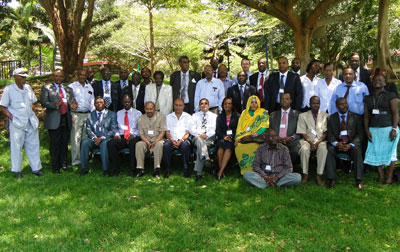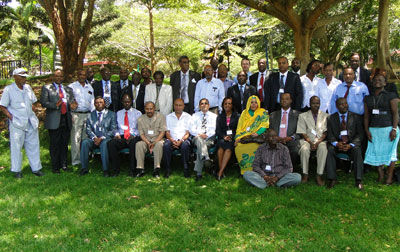 As a major approach of promoting strategic partnership and alliances, IGAD and IUCN established a biennial meeting of directors of conservation related ministries and finance related ministries from the member states. The first such forum was held in Mombasa, Kenya in 2007 where very important recommendations were made. The Entebbe conference like the previous one in Mombasa offered rare opportunity for high level consultations between the people who control the funds (Finance and Planning) and those who manage the natural resources (Directors of Conservation). These policy and decision makers have at all times in this forum confirmed that they rarely meet at country level to discuss natural resources utilization although it is the backbone of their economies.
As a major approach of promoting strategic partnership and alliances, IGAD and IUCN established a biennial meeting of directors of conservation related ministries and finance related ministries from the member states. The first such forum was held in Mombasa, Kenya in 2007 where very important recommendations were made. The Entebbe conference like the previous one in Mombasa offered rare opportunity for high level consultations between the people who control the funds (Finance and Planning) and those who manage the natural resources (Directors of Conservation). These policy and decision makers have at all times in this forum confirmed that they rarely meet at country level to discuss natural resources utilization although it is the backbone of their economies.
The overall theme of the conference was ‘environment and natural resources as a core asset for wealth creation, poverty reduction and sustainable development. There was need to feedback on the work of IGAD, IUCN and IDRC on agenda set in the previous conferences in particular the understanding on drylands economic value and opportunities to diversify livelihoods beyond livestock in Arid and semi arid areas of IGAD. More important was to strengthen the rural economy and understand the extent to which environmental assets (goods and services) are important and the extent to which such values are integrated into macro-economic planning.
The meeting was attended by directors from all IGAD member states, representatives of civil society and knowledgeable resource persons from the region and outside the region.
After the two days deliberation the conference made further recommendations for the follow-up action by all partners and proposed indicators to monitor the follow-up of these recommendations. Among the most urgent recommendation was for IGAD to launch a strategy for management , market chains and value addition for products in ASALs. Finally it was agreed that IGAD would prepare briefing notes capturing the experiences of the participant and as information packages for the directors and identify issues consideration by the IGAD policy organs.

